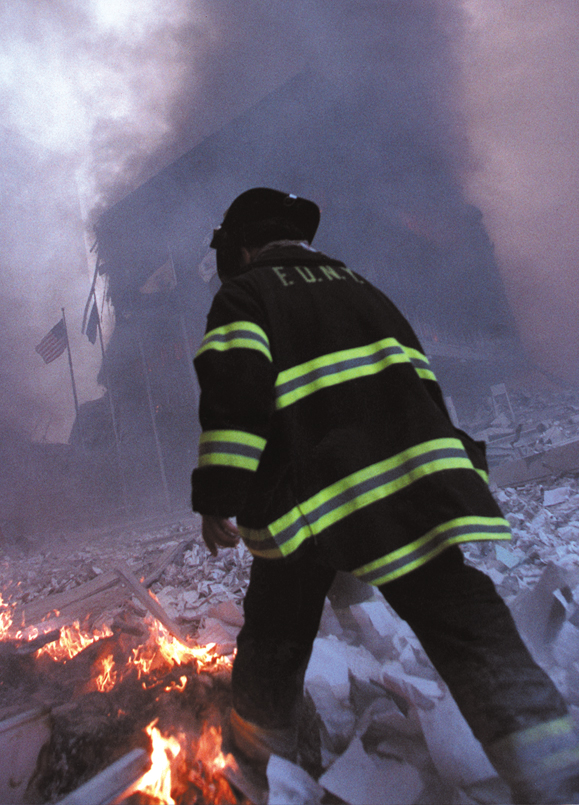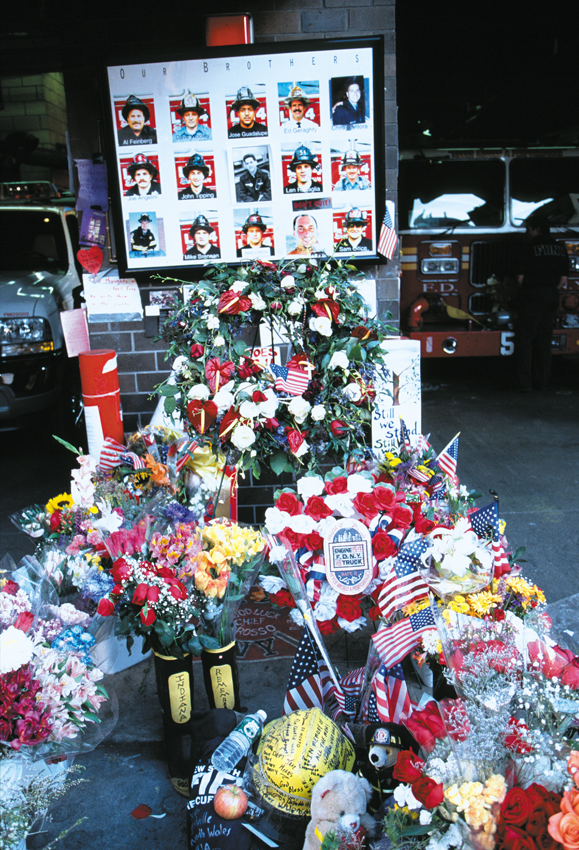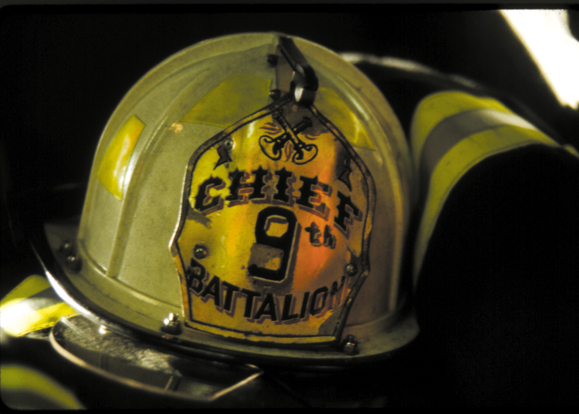The New York Fire Department suffered harrowing losses on September 11. Pete Hamill writes on the men, women and the history of this fine institution.
We would see them on summer afternoons, big and brawny or wiry and tough, standing outside the fire-houses all over the city. Their denim shirts were often stained with sweat. They had the ease of men who did not need to brag about the work they did. It seemed that they were always laughing.
We would see them when city leaves turned yellow with autumn, standing in the open doors of those firehouses. Inside, the red fire trucks and engines glistened with the pride of craftsmen who respected their tools. They seemed to love talking with small children. They were all, it seemed, fond of dogs. They sometimes paused and breathed deeply of the crisp air of October, for no men understood better the special beauty of a cleansing breeze. It seemed that they were always laughing.
We would see them inside the closed doors of the New York winter, waiting casually, almost indolently for the sounds of alarms. Upstairs, they talked with passion about food, for they cooked for themselves, and the menu was a kind of democratic choice. In all the places that we ever visited, the job of chef seemed to fall upon the Italian-Americans among them. Lasagna, home-made, with fresh loaves of Italian bread seemed to be the favorite food of Irish-American firemen, and Latinos, and the tough children of the Eastern European Jews, and those whose ancestors went all the way back to Africa. Too often the food went cold as they raced off to practice their dangerous craft. It seemed that they were always laughing.
We would see them in the springtime, the overcoats of winter gone, ballgames playing now on radios, as young women walked by the fire houses to the subways, objects of their admiring collective gaze. They made no rude noises, no crude remarks. Their admiration was always aesthetic, like visitors to museums shocked into silence by the sight of beauty. And after all, most of them were young themselves, their lives filled with the infinite possibilities of youth. They celebrated the multiple beauties of this world because their craft so often took them into horror. And always, always, it seemed that they were laughing.
Now 353 of those firemen are gone. Sept. 11, 2001 was a calamity for thousands of New Yorkers, for its citizens, police, EMS workers. We have all suffered unacceptable losses. But it was also the single worst day in the long history of the New York Fire Department. No other day even comes close.
The firemen were organized as a single unit in 1865 at the command of Albany, and became in 1870, at the urgings of an old fireman named Boss Tweed, the Fire Department of New York. That is why the caps and insignias say FDNY, not NYFD. They began when 86th St. was a distant suburb. They began before the five boroughs were joined into one city in 1898. They have been fighting fires and saving lives ever since, day after day, night after night, in all seasons. Among them now are hundreds of women, as brave as any of the men. Together, these firefighters have summoned their Celtic pipe band to bury too many of their comrades.
But until Sept. 11, the worst single day for the FDNY took place in October 1966, when a floor collapsed in a burning building on 23d St. That day 12 firemen were killed. That week, New York was shocked and numbed. None of us then alive could have imagined a day when almost 30 times that number would perish in smoke, fire and exploded steel. No firemen could have been prepared to deal with such murderous ferocity.
It seems to be no accident, in a city of such widespread valor, that in the numbered shorthand of our most terrible day the first three numbers were 911.
Entire fire companies have now disappeared from the landscape of New York. Every living fireman has lost friends or relatives. Even now, the bodies of hundreds of firemen remain entombed under the smoking rubble of Ground Zero. Most of the top brass vanished while serving at the front. But the heaviest casualties were among the infantry of the FDNY, those who would never pause when asked to take that hill or that town. Men just like them died at Anzio and Omaha Beach, in the Hurtgen Forest and Monte Cassino, on Tarawa, Iwo Jima and Okinawa and too many other god-forsaken places from the Yalu Reservoir to Anh Khe. In all those places, and in the towers of lower Manhattan, decent men became young forever.

Many of the men were married, with wives and children now scattered all over the metropolitan area, orphaned by the heartless storm of fanaticism. Many were single, in the first sweet stages of maturity. Some were veterans, gnarled but not hardened by repeated exposure to human suffering, bearers of the department’s memory, teachers of their dangerous craft. Many were the children of firemen, or had their own children assigned to our firehouses. Not one of them woke up that morning thinking it might be their last.
An old reporter visiting the site on the night of the disaster said to a middle-aged policeman: “Thank you. You guys are real heroes.”
“No, no, we’re not,” he said, heavy with exhaustion and sorrow. “We’re here, two blocks away. The cops on the scene, they’re heroes. The ambulance guys, heroes.” Then he shook his head and smothered a sob. “But those firemen, those crazy goddamned firemen…”
Those crazy goddamned firemen were all part of the same band of brothers, transcending the petty differences of race or religion. The arrival of women in their ranks about twenty years ago made some of the men uncomfortable but they seemed to adjust very quickly. Differences of ethnicity or gender were most often dissolved in jokes and laughter. The ethos of the department remained the same, like that of combat soldiers, forged in shared adversity.
Some could trace their FDNY lineage back through the generations. Sons and daughters honored fathers and grandfathers by taking their own places in the fire companies of New York. Some, of course, were the first in their families to lug hose into burning buildings. But Irishness was there from the beginning, when the children of the Famine Irish climbed upon horse-drawn trucks to race to the rescue. In some old FDNY families, where Mayo and Galway were the countries of origin, one son was a cop, one was a fireman, and the third was a priest. In firehouses, there were jokes about the new recruits, whose names were transformed into O’Morales or McLevin. Nobody at Ground Zero on Sept. 11 can ever forget that black fireman weeping for “my brothers” — who were, of course, the bearers of Irish, Italian, Hispanic and Jewish names. That no women firefighters died that day was a mere accident of fate. They were there – willing and able.
Nor should anybody ever forget the multiple images of firemen in helmets and rubbery raincoats, carrying equipment into the towers while frantic civilians moved past them in the direction of open streets, cobalt skies and breathable air. At an improvised firehouse altar on Lafayette St., one sign, hand-lettered by a citizen, said: “YOU RAN IN WHEN WE RAN OUT. WE ARE GRATEFUL FOREVER” That firehouse lost 14 men.
Everyone in the city seemed to understand that the primary mission of those firemen was to save human life. That is the job. Life first, property second. Firefighters — male or female — don’t pack guns. They are not asked to face criminals or madmen. They don’t ever confront fellow citizens, the way police officers sometimes must: to impose order on chaos. They don’t make arrests. They don’t need to make split-second judgments about innocence or guilt. They are simply there to save human life.
In the days and years to come, the lives of the men who perished on Sept. 11 will be memorialized by historians. We hope they will emerge as complete individuals, who lived dense, rounded lives. We hope they will flower as human beings full of hopes, ambitions, desires, and the usual human imperfections. But when we looked at their faces, even in official photographs, we could see the obvious pride. And the individuality of style. And in many of them, the twinkle in the eyes. Clearly, these men ennobled our race, which is, of course, the human race.

Remember too that these men — the firemen of Sept. 11 — were extraordinary human beings. They went where most human beings never go. They kept climbing and climbing and climbing, into the smoke-fouled air, looking for living human beings. They went towards the fire, which so terrified the trapped people of the upper floors that they preferred leaping to their deaths. These firemen died while climbing towards the fearful sky.
Now, and in all the days to come, for all of us who remain among the living, we must honor them each time we pass a firehouse. With a tip of a hat. A nod. A word of thanks. We must honor what they did, and what their brothers and sisters keep on doing. They will, of course, honor us in the coming days with their courage, their tenacity, and their laughter. ♦


Leave it to the wonderful Pete Hamill to say it all as that awful anniversary approaches again.
Wonderful piece, crying real tears.